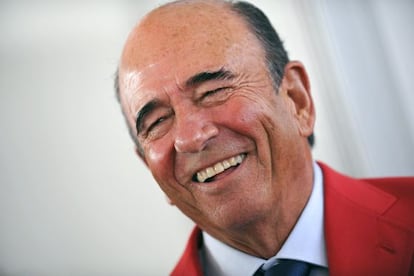The man who revolutionized the Spanish banking sector
Age was no obstacle for Botín, who remained on the frontline at Santander until his death


When Emilio Botín Sanz de Sautuola y García de los Ríos inherited the chairmanship of Banco Santander from his father in 1986, the lender was still very much a family business. The bank had made a few incursions into Latin America, and managed to become one of the seven biggest in Spain. But at that time, Santander was the smallest of all of them. At the time of Botín’s death it had become the biggest in Europe, and one of the 10 biggest in the world. And it is all down to the initiatives undertaken by Emilio Botín, who would have turned 80 on October 1.
The son and grandson of bankers, and born in the capital of Cantabria, Santander, he studied law and economics at the University of Deusto. In Bilbao he met his wife, Paloma O’Shea Artiñano, from Getxo (Vizcaya), whom he married in 1958 and with whom he has six children: Ana Patricia, Carolina, Paloma, Carmen, Emilio and Francisco Javier. His only brother, Jaime, two years his junior, inherited the chairmanship of another Spanish lender, Bankinter, from his father, a post he later left to focus on his private life.
He was one of the most influential people in Spain and also held great prestige the world over
The elder Botín brother, however, was a man of action, who was a keen sportsman (in particular golf) with a frugal appetite. He was one of the most influential people in Spain and also held great prestige the world over. He was keen to cultivate good relationships with politicians, union leaders, economists, journalists and figures in the world of culture, with all of whom he would sound out opinions with a view to forming his own. His latest obsessions included the emergence of new political party Podemos, the Catalan drive for independence and the rise of new Socialist leader Pedro Sánchez.
His opinions were always taken into account by governments, although Botín was careful not to tie himself too closely to any party or politician. He always backed the four prime ministers with whom he worked, and never criticized their actions.
Botín was a devotee of Sun Tzu’s The Art of War, the military strategy manual written over 2,500 years ago
Just three years after he took the reins of power, Botín shook up the market with the launch of a new bank account. The decision changed the path taken by his competitors and saw the bank start to gain ground.
Botín was a self-confessed devotee of Sun Tzu’s The Art of War, the military strategy manual written more than 2,500 years ago in which he found inspiration when it came to beating his adversaries. The rest of the banks in the Spanish market were unable to keep up with the speed of Botín’s actions. Their weaknesses led to a transformation of the sector, which eventually saw Santander take over three of the biggest Spanish banks: Banesto, Central and Hispano.
The emerging lender had gained the necessary weight to expand internationally, in particular in Latin America. It had also been collecting some of the best executives in the sector, who were paid better than anywhere else. In the early years after the merger, the bank completed its expansion in Latin America with the purchase of the Serfin group in Mexico, and Banespa in Brazil, as well as buying up smaller lenders in Argentina, Chile and Venezuela.
When Botín was called into the High Court, an armored truck loaded with bail money was hovering nearby
In 2004, it took over Abbey, which at the time was the sixth-biggest lender in the United Kingdom. Later on, during the economic crisis, it consolidated its presence in the British and Brazilian markets, and entered Poland. It also got a foothold in the United States with the purchase of Sovereign.
His résumé contains a few brushes with the law, including several cases brought against Santander by a group of lawyers with close links to the former chief of Banesto, Rafael Pérez Escolar, with whom he engaged in many battles at Santander shareholder meetings – battles that are likely to continue among the two men’s successors. According to sources with knowledge of the subject, when Botín was called into the High Court over an opaque financial product Santander had offered its customers, an armored truck loaded with cash was hovering nearby should the judge decide to impose a multi-million-peseta bail on Botín. In the end, however, he walked out of the courtroom without having to post any money.
More recently he was forced to pay taxes on bank accounts held in Switzerland after his name – and those of five of his six children – appeared on a leaked list of 659 Spaniards who were hiding more than €6 billion in the Swiss branch of HSBC. The High Court ended up shelving the case against Botín.
Tu suscripción se está usando en otro dispositivo
¿Quieres añadir otro usuario a tu suscripción?
Si continúas leyendo en este dispositivo, no se podrá leer en el otro.
FlechaTu suscripción se está usando en otro dispositivo y solo puedes acceder a EL PAÍS desde un dispositivo a la vez.
Si quieres compartir tu cuenta, cambia tu suscripción a la modalidad Premium, así podrás añadir otro usuario. Cada uno accederá con su propia cuenta de email, lo que os permitirá personalizar vuestra experiencia en EL PAÍS.
¿Tienes una suscripción de empresa? Accede aquí para contratar más cuentas.
En el caso de no saber quién está usando tu cuenta, te recomendamos cambiar tu contraseña aquí.
Si decides continuar compartiendo tu cuenta, este mensaje se mostrará en tu dispositivo y en el de la otra persona que está usando tu cuenta de forma indefinida, afectando a tu experiencia de lectura. Puedes consultar aquí los términos y condiciones de la suscripción digital.








































